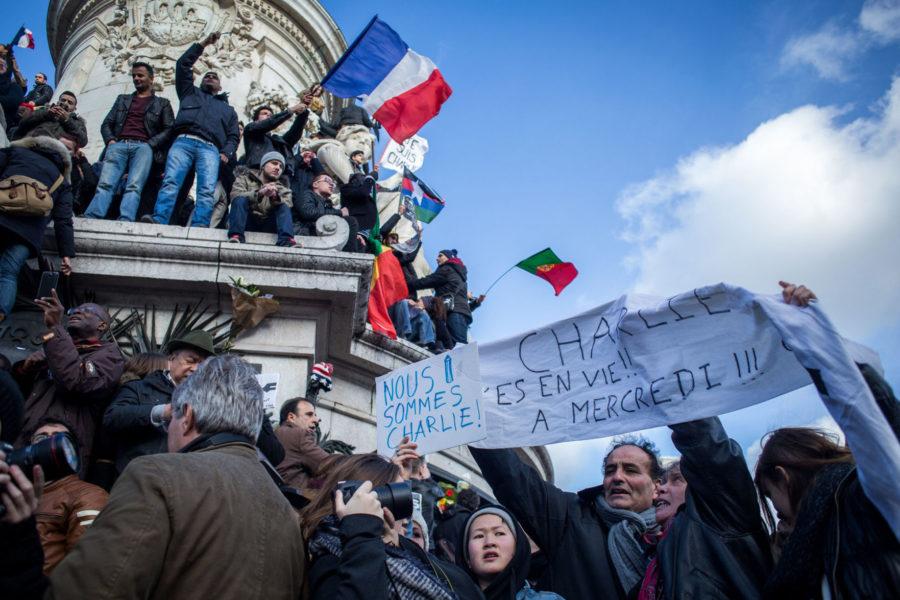Campus departments hold ‘Je Suis Charlie’ discussion
People gather in Paris during a unity rally on Sunday, Jan. 11, 2015, in tribute to the 17 victims of a three-day killing spree by homegrown Islamists. (Michael Bunel/NurPhoto/Zuma Press/TNS)
Jan 22, 2015
Last updated on May 10, 2016 at 10:43 p.m.
More questions than answers were found at the packed “Are We Charlie? – France, Europe and the World after 1/11” forum held Wednesday. A panel of five professors facilitated a discussion that served as the campus community’s first reaction to the recent terrorist attacks in France.
Discussion topics ranged from the idea of freedom of speech, a comparison between France and the United States and issues of religion and nationalism.
On Jan. 7, two gunmen attacked the office of French satirical magazine Charlie Hebdo, and another gunman, in a related attack, took hostages in a kosher supermarket on Jan. 9. Combined, the attacks resulted in the deaths of 17 people. The magazine was targeted after it continuously published cartoons of the Prophet Muhammad, whose image is considered sacred to Muslims.
Marcus Keller, associate professor of French and Italian and coordinator of the forum, said mass unity marches held on Jan. 11 following the Paris shootings were the largest demonstrations in France since WWII.
Get The Daily Illini in your inbox!
Nancy Blake, professor of comparative and world literature, spoke from the panel about her experience being in France during the attacks.
She said her apartment was five minutes from the Charlie Hebdo office.
“When I walked across the Seine from my apartment in Paris, I walked past the (Arab World Institute), and I saw them putting “Je Suis Charlie” in French and in Arabic on the side of it, and that just looked wonderful to me,” Blake said.
Yasemin Yildiz, associate professor of Germanic languages and literatures, talked about the German response to the Paris shootings. Anti-Islam protestors and members of the Patriotic Europeans against the Islamization of the West have continued to demonstrate in protests that began prior to the attacks in Paris, he said.
Yildiz said although people were worried the attack might polarize Germany further, they have not increased the influence of PEGIDA, and the media and politicians from every party are against the movement. While the slogan “I Am Charlie” took off in France, the slogan “I Am Charlie, But I Am Not PEGIDA” was used in Germany, said Yildiz.
Maimouna Barro, associate director of the Center for African Studies, said she is a Muslim and spoke about the importance of responsibility and respect. She said what the shooters did was not jihad, an arabic word translating to religious struggle, because they did not respect others or themselves and others claiming to fight in the name of Islam were similarly not practicing jihad.
“They call it jihad. But this is not the real jihad. Jihad is jihad with the pen, jihad through education, not jihad with the sword,” Barro said.
Jean-Philippe Mathy, professor of French, said not everyone supports Charlie Hebdo. He explained that the French government has arrested dozens of people who have publicly used hate speech that was sympathetic to the shooters under anti-terrorism laws passed in September 2014.
“The distinction between free speech and hate speech in French law is based on the difference between attacking a symbol and offending or threating people on the basis of their race or religion on the other.”
The forum closed with remarks by Keller.
“I think today has shown there’s tremendous interest, and I’m sure there will be other events,” he said.
Andrew can be reached at [email protected].






